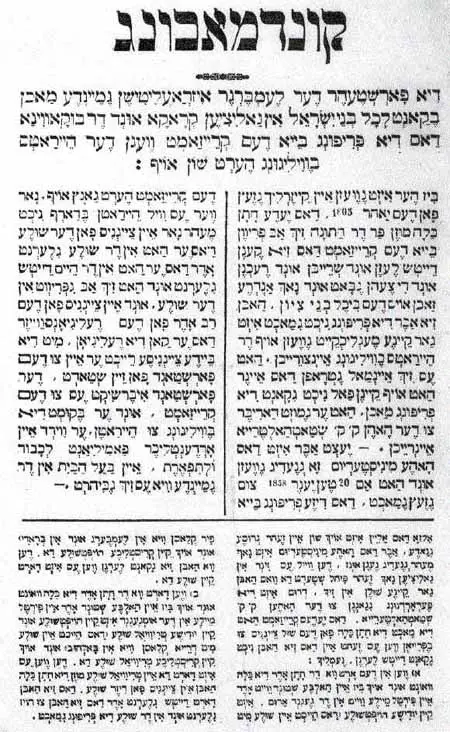Witnesses to History: The Jews of Lemberg
A three-page broadside in Yiddish, issued by the representatives of the Lemberg Jewish Community, informs the Jews of Galicia (of which Lemberg was the capitol), krakow, and Bukovina of a change in the Austrian Imperial government's marriage requirements law. A royal decree issued in 1805 made it mandatory for a Jewish bride and groom to pass a test in reading and writing in German, arithmetic, and Jewish knowledge in order to receive Imperial permission to marry A new law, announced on January 20, 1858, rescinded the test, substituting in its stead proof that bride and groom had studied German at school or at home, and an authentication by a rabbi or a religious teacher that they had sufficient Jewish religious knowledge. The law further provided that a bride and groom would be released from such requirements on submission of proof that economic hardship made it impossible to study, e.g., if they were orphans, common laborers, servants, etc.
 |
The broadside discloses that many Orthodox couples resisted the government decree to study German and Judaism from a governmentally approved textbook, B'nai Zion, which they considered not only religious coercion but forced assimilation which might lead to apostasy. They married secretly, "according to the Laws of Moses and Israel," without registering their marriages with the government. Legally, they remained unmarried, which the broadside reminds, led to all sorts of problems and scandals. Now, the broadside announces, the new legal provision makes it possible for all Jews to disclose their marital status without fear of punishment, and it urges all Jewish brides and grooms to conform to these governmental requirements.
This broadside brings into sharp focus the conflict between segments of the Jewish community in the Austro-Hungarian Empire, which promoted emancipation, and welcomed "enlightenment," even if governmentally inspired or promoted, and the majority of Jews who resisted such religious and cultural coercion, however well-meaning and benign it might be.
Sources: Abraham J. Karp, From the Ends of the Earth: Judaic Treasures of the Library of Congress, (DC: Library of Congress, 1991).


